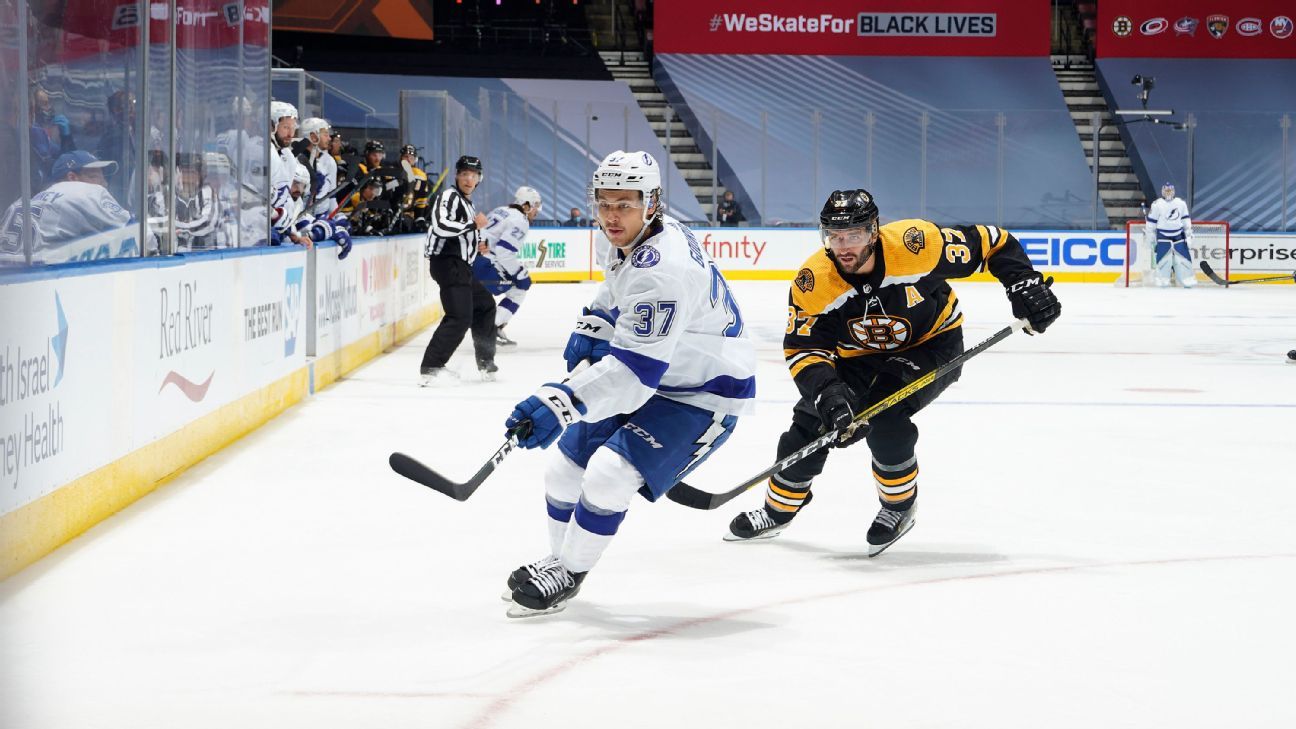
The 2020 NHL playoffs roll on to the conference semifinals beginning Saturday, with the Colorado Avalanche taking on the Dallas Stars.
Tampa Bay won three of four regular-season matchups against Boston, as well as their contest in the round-robin portion of the postseason. Will the Bruins reverse that trend in this series?
Note: Advanced stats are from Hockey Reference, Natural Stat Trick and Evolving Hockey
More: Check out the full NHL postseason schedule here.
No. 2 Tampa Bay Lightning vs. No. 4 Boston Bruins
What we learned in the first round: If the Lightning were going to make a run this summer, first they would have to exorcise some demons. Tampa Bay got to face John Tortorella's forecheck-focused Columbus Blue Jackets again in the first round and this time pulled away, gaining momentum from a five-overtime Game 1 victory. Tampa Bay did it all without Steven Stamkos, who is sidelined because of injury. The Lightning flexed their overall roster depth, though Stamkos' absence looms.
The Bruins sleepwalked through the round robin, dropping all the way from the No. 1 to the No. 4 seed and leaving many wondering whether they could muster urgency this summer. Spoiler: They could. Goalie Tuukka Rask left the bubble to attend to family matters, but his teammates rallied against the Carolina Hurricanes, a team Zdeno Chara lauded as "well-coached" with "a dangerous lineup." David Pastrnak missed most of the series, but seasoned vets such as Brad Marchand and David Krejci more than compensated.
First line: Pastrnak returned in Game 5 versus the Canes, which means the Perfection Line with Patrice Bergeron and Brad Marchand is back intact. Pastrnak appears to be a full go, leading Boston forwards in ice time (20:28 per game) and firing five shots on net in his first game back. Without Stamkos, the Lightning are rolling out Brayden Point, Nikita Kucherov and Ondrej Palat on the top line. Point (five goals, five assists in eight games, including two overtime winners) is having a terrific postseason. But perhaps here is where we mention that though the Lightning are generating plenty of high-danger chances, they're having a hard time finishing. They have just 20 goals through eight games and scored more than three goals just once. They could get by Columbus without Stamkos, but it will be harder in this series. Advantage: Bruins
Forward depth: Boston's second line of Jake DeBrusk, Krejci and Ondrej Kase is buzzing, driving possession and creating Grade-A chances. The third line, anchored by Charlie Coyle (66% expected goals rate against Carolina) is strong, too, but there's a drop-off after that. Tampa Bay's second line, centered by Anthony Cirelli, isn't producing at its best, but the third line featuring Blake Coleman, Barclay Goodrow and Yanni Gourde is playing great hockey. You'll hear a lot about how GM Julien BriseBois bolstered his forward group with grit via the additions of Coleman and Goodrow at the trade deadline and Patrick Maroon last summer. Tampa Bay's fourth line holds a significant edge over Boston's as well. Advantage: Lightning
Defense: This postseason has been a bit of a revelation for Zach Bogosian, who has revived his career in Tampa Bay, thanks, in part, to a great assignment of playing alongside Norris Trophy nominee Victor Hedman. Hedman was an absolute force in the Carolina series. The two pairings behind them are extremely solid. In Boston, Charlie McAvoy asserts himself as a top defenseman in this league. In a sign of the times, he carries the weight on his pairing with Zdeno Chara. It's hard to find too many faults in Boston's top six, and keep an eye on Matt Grzelcyk, who keeps picking up more responsibilities. Advantage: Tie
Goaltending: With Rask out, Jaroslav Halak assumes No. 1 duties. Over the past two seasons (66 starts), Halak has a .921 save percentage and 12.4 goals saved above average. The Bruins have total faith in the 35-year-old Halak. The issue is workload, especially with two back-to-backs baked into the schedule. The backup is 23-year-old Dan Vladar, who has never played an NHL game. In Tampa Bay, you know what you're getting from Andrei Vasilevskiy, the reigning Vezina Trophy winner who is up for the award again this season. Vasilevskiy has a .923 save percentage at even strength this postseason. Advantage: Lightning
Coaching: Bruce Cassidy is a Jack Adams nominee for leading the Bruins to a Presidents' Trophy (they were the only team to hit 100 points before the pause). In his second stint as an NHL coach, Cassidy has become wiser and knows all the right buttons to push with this group. Jon Cooper has also achieved great regular-season success with Tampa Bay in his tenure, but until this team can get over the hump in the postseason, that will be a mark against him. Advantage: Bruins
Special teams: On paper, these two have nearly identical postseason stats. Tampa Bay's 13.3% on the power play is disappointing considering that the Lightning (like Boston) were a top-five team with man advantage during the regular season. Not to harp too much on the absence of Stamkos, but his presence certainly would add a boost here. Boston's 17.9% on the power play is a big advantage, though the Bruins are slightly behind on the penalty kill (85.7% to Tampa Bay's 87.1%). Advantage: Bruins
Prediction: Bruins in seven. This is a clash of the Eastern Conference's two best teams this season, and hockey fans are in for a treat. Although we're expecting tight, tough-contested battles, the Bruins seem to be clicking at just the right time to avenge their 2018 second-round loss.















 Phone: (800) 737. 6040
Phone: (800) 737. 6040 Fax: (800) 825 5558
Fax: (800) 825 5558 Website:
Website:  Email:
Email: 






